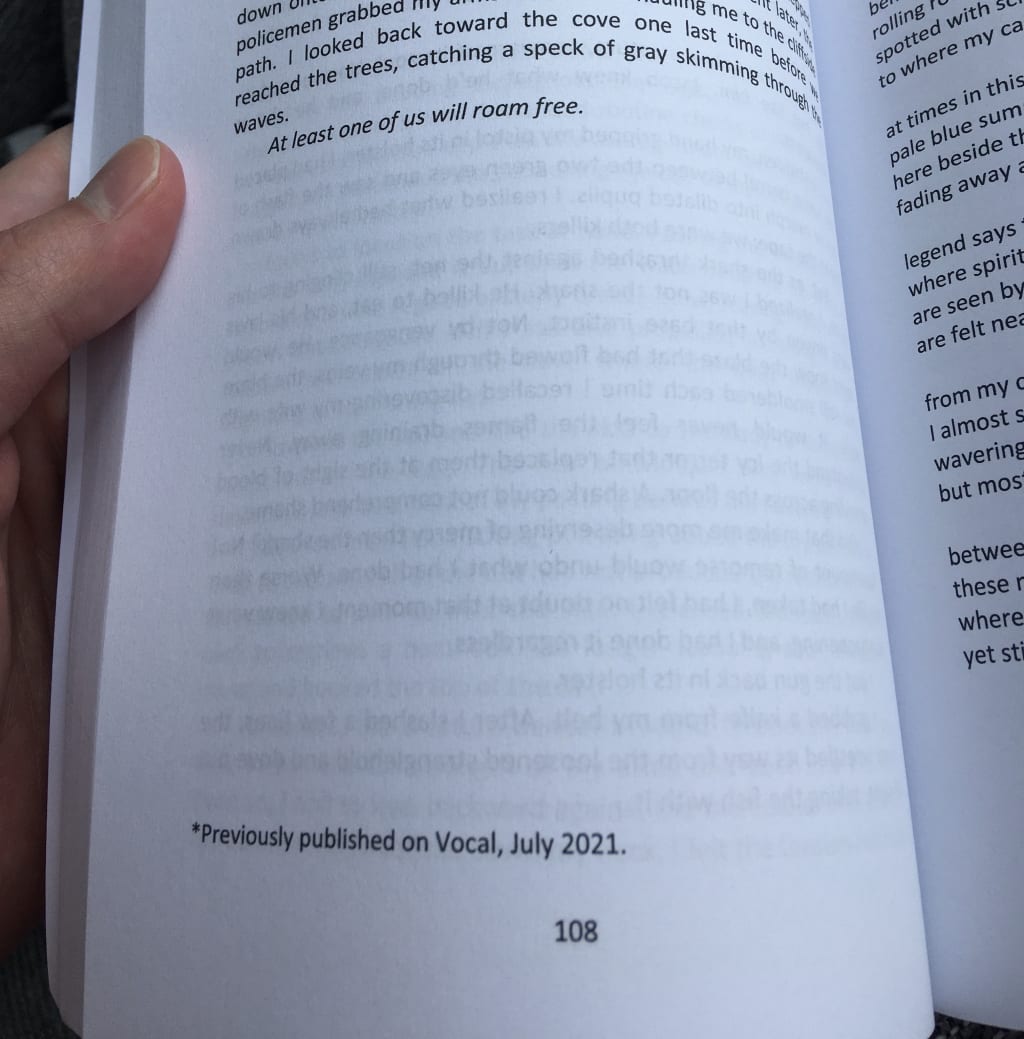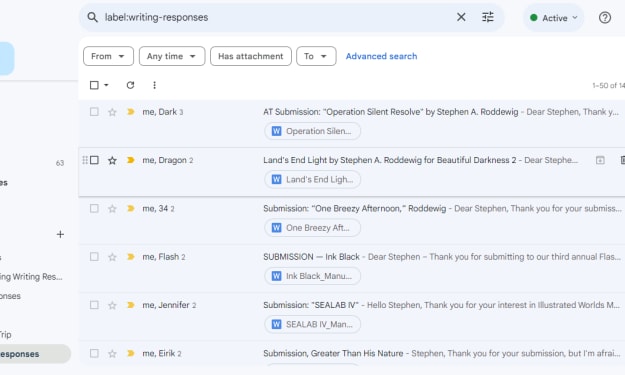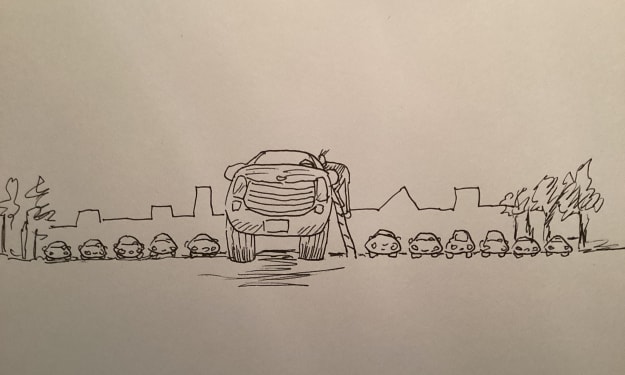Author Talk: The Great Content Recycling Ecosystem
The only greater existential crisis than realizing I spend more time selling stories than writing them is realizing a lot of that time is spent selling the same story *again*

To misquote the band Sublime:
It’s so nice, I wanna publish the same story twice
Sidebar 1: Did you know their greatest success came after the lead singer Bradley Nowell was already dead? What could have been...
Anyhow, we’re here to talk about one of the greatest kept secrets of what I’ve termed the traditional fiction world:
Reprints
What is a reprint? In short, it’s a piece of fiction, poetry, or other creative work that was previously published on another platform.
Let me hit on that last bit again. The point of a reprint is that it hasn’t appeared in the place you’re submitting it to now. It’s appeared somewhere else. To republish the same piece in the same place again is, in a word, unethical. And I don’t mean making some slight alteration and calling it net new. We can’t all retitle a piece and get a Top Story out of it.
Given they are the bulk of my experience, I will focus on short stories from here on out.
For the longest time, I never really thought about reprints. They were far out in left field, something that I would worry about once I had actually sold a story. Fairly logical approach, I’ll admit, since there’s no use selling reprints for stories you’ve yet to publish. Though that might give an editor a chuckle or two before they reject you outright.
Thus, one day back in 2022 (I write as if that’s ancient history), I knew I had made it when I opened a new tab in my submissions tracker Excel sheet and titled it “Pubs for Land’s End Reprints.” Let the learning begin.
So, I decided I’d compile a few lessons I’ve learned over the past 1.5 years. Bonus: there’s a section here specific to you. Yes, you, Vocal creator. Don’t go anywhere.
Lesson 1: Your Options are Fewer
The first lesson to learn is that reprints are viewed as less valuable by publishers on the whole. A good number don’t take them at all.
I went to ChillSubs.com and clicked into their literary magazine database. Of the 3,296 magazines they track at the time of this writing, 755 accept reprints. That rounds up to 23%.
Now, I acknowledge that this is far from a hard statistical fact, but you know what? It took me all of three clicks to bring some hard numbers into this discussion. Hats off to you, Chill Subs. Keep fighting the good fight.
Why do so few publishers take reprints? Well, only their individual owners/editors can truly answer that, but that doesn’t stop me from rash speculation.
The logic goes something like this: we (the publisher) want to offer fresh, new, enticing content to attract readers. Material that has appeared somewhere else may be viewed as old, tired, cheap, as if we’re trying to cut lemonade with water to make it cheaper to produce. Our readers will feel cheated if we reuse content.
Personally, I don’t really see it. What are the odds that their audience overlaps with the audience of the OG publisher? Do you know how many anthologies, magazines, and websites go live every month? It seems incredibly unlikely.
That said, most publishers get more than enough original content to do just fine, so I am very appreciative of those who do take reprints.
Which brings us to the next lesson:
Lesson 2: Expect Rejection Just as Often
Perhaps more.
I originally thought that, having cleared the first hurdle of original publication, I could now shop this story around with new-found clout and see all sorts of doors opening to me.
“Wow,” the hypothetical editor says, “if it was good enough for Abyss & Apex, it’s good enough for us.”
Not quite.
Just as they’re less receptive to reprints, publishers are also much more exacting about those previously published stories that they will accept.
There’s nothing much you can do about this, unfortunately, except the usual submission tactics:
- DON’T SEND REPRINTS TO MAGAZINES THAT DON’T TAKE THEM (read that again)
- Read the guidelines with a magnifying glass
- Send stories that match the genre the publisher accepts
- Be clear and up front about your story’s status as a reprint
- Accept the eventual rejection with grace and move on to the next opportunity
Bonus: you can feel a smug sense of satisfaction when the form rejection wishes you best of luck placing the story elsewhere.
Joke’s on you, it’s already been placed somewhere!
Lesson 3: Expect Less Money (Even None)
But, I mean, that’s money you otherwise wouldn’t have, right?
Except if they don’t pay, I suppose.
Yes, the theme of “reprints aren’t as valuable to us, you plebeian” continues. Of those magazines that are in the market for this content, expect to read a pay statement that differentiates original and reprint pieces.
For example: $0.05 per word for original stories/$0.01 per word for reprints
This isn’t a huge sticking point for me, but I figure it’s worth setting expectations. I’ve even published a reprint for no payment at all. My ultimate goal is to get my story in front of many eyes as possible. Any extra cash I make along the way is nice, but it would take an exceptionally exploitative contract to make me turn down a reprint deal.
But don’t get me twisted: I am much more exacting about terms when it comes to selling original works.
Lesson 4: You’re in a Tough Spot Trying to Market the Same Story to Your Fans
And, ethically, should you?
Personally, I never have—except in the rare case I didn’t promote the original publication.
How often has this happened? Exactly once, since this publisher was dumb enough to not offer their book on any major selling platform. I face an uphill battle convincing my fans to spend their hard-earned money on my writing without asking them to trust their credit card information to a website they’ve never heard of.
Along comes another publisher that accepts my reprinted pirate story and is wise enough to do business through Amazon, and it’s a match made in Heaven.
It doesn’t necessarily have to be Amazon, but Lulu.com? Come on!
If you are going to promote the reprint, at least be up front about it being just that: a reprint. I can’t think of a better way to alienate fans than to deceive them into buying a story they already own.
Lesson 5: There is Synergy Between Vocal and the Reprint Market
I promised, didn’t I?
I’ve talked about it before, but, briefly, one of the tradeoffs of writing for a platform like Vocal is you trade accessibility and exposure for first publish rights. I won’t beat that drum anymore.
But this does not need to be the end of the line for your Vocal short stories. It’s an even steeper path than a “traditional reprint,” since those non-plussed publishers frown even more on reprints that are on a publicly accessible website*. Their thinking is “why would anyone pay for our book when they can get it online for free?”
I repeat my previous point: just how much attention do you think people are paying that they’d even know to check for that?
*To be fair, this isn’t exclusive to Vocal content. They’d raise an eyebrow at stories coming from Medium, Wattpad, WordPress, personal blogs, what have you.
Anyhow, harder though it may be, your Vocal stories also count as reprints and therefore are eligible for publishers that accept them—unless they specifically mandate no stories previously published online, which can happen. Just be clear about the story’s origin and let the chips fall where they may.
Don’t believe me? I finally made it happen myself just a couple months ago. I’ve included the link to the story below which itself includes the link to the print anthology it was reprinted in:
Sidebar 2: This will be the only link to any of my content in this article. Too often I encounter “advice articles” that are, in reality, barely disguised linkfests where every piece of thin advice is followed by “see an example in this piece I wrote.” A few self-referential links are tolerable when directly relevant to the discussion (see above). However, if all you’re going to do is promote your own work, then don’t bother pretending you have something valuable to say. And save us the trouble of reading it while you’re at it.
I have spoken.
Lesson 6: Expect Some Odd Situations When the Reprint Publisher Wants Edits
At least, it felt odd to me.
If what Publisher B releases is different than what Publisher A released, is it still technically a reprint at this point?
The short answer is, unless Publisher B demands substantive changes to the plot, characters, or other core elements of the story, yes.
In my case, they had asked that I remove the harder curse words so that they wouldn’t offend sensitive readers. It wasn’t an unreasonable request, but I still felt like this was corrupting the spirit of a reprint. Shouldn’t it appear exactly as it did previously?
Then I remembered that odds were no one but me would even be aware of this discrepancy, much less care. Besides, to earn $25 for a story I originally published on Vocal for no cash at all? My integrity decided to take a smoke break right about then.
So, Are Reprints Worthwhile?
On the whole, I believe so. I certainly am pursuing them just as voraciously as I am pursuing original publish rights (all the mitigating factors discussed above notwithstanding).
Here’s how I look at it: I spent a good amount of time drafting, refining, editing, and then selling my story. To get it published at all was a massive achievement, but why let that be the end of the story? (*rimshot*) Given all the investment, I owe it to my creation to attempt to get as many miles out of it as possible. If I reach new readers and get a few more bucks out of it, so much the better.
Plus, there’s always something fulfilling about holding a story you first published online in your hands—assuming the reprint is in print, of course. And finally, it’s cool to see the little “Originally published in” blurb. Feels like a new layer of legitimacy. Not only did this publisher think my work was all right, but this other one did before them.
All that said, reprints are a bit anti-climactic in that I’m not going to my fans and hyping up this publish credit. Why would I? I already hyped up the original! They’re less milestones* and more a continual investment in your writing brand and (hopefully) your readership.
*But absolutely celebrate the hell out of your first reprint. That’s an achievement in itself.
Go forth and conquer!
About the Creator
Stephen A. Roddewig
I am an award-winning author from Arlington, Virginia. Started with short stories, moved to novels.
...and on that note: A Bloody Business is now live! More details.
Proud member of the Horror Writers Association 🐦⬛
Enjoyed the story? Support the Creator.
Subscribe for free to receive all their stories in your feed. You could also pledge your support or give them a one-off tip, letting them know you appreciate their work.
Reader insights
Outstanding
Excellent work. Looking forward to reading more!
Top insights
Expert insights and opinions
Arguments were carefully researched and presented
On-point and relevant
Writing reflected the title & theme






Comments (1)
I'm glad I read this before galivanting reprints around like they are new, lol. I appreciate your insights. Keep them coming...